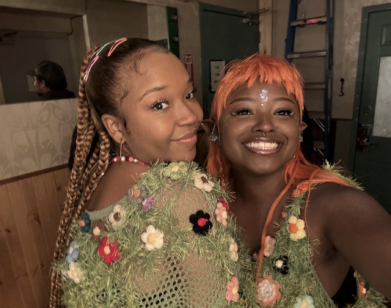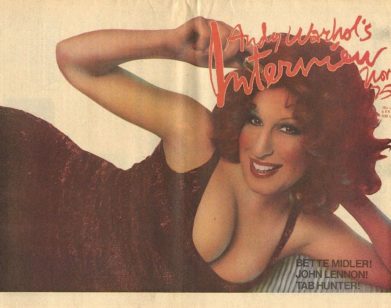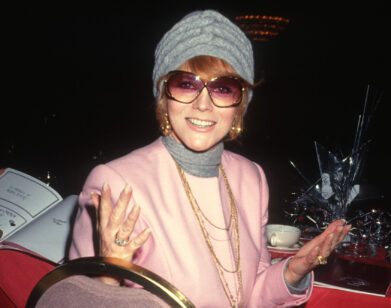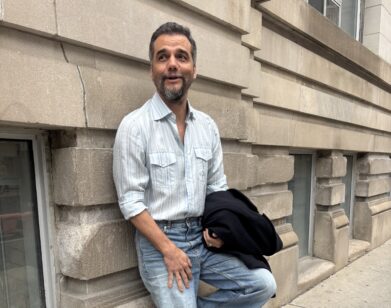film
The “Antebellum” Directors on Ancestry and Purpose
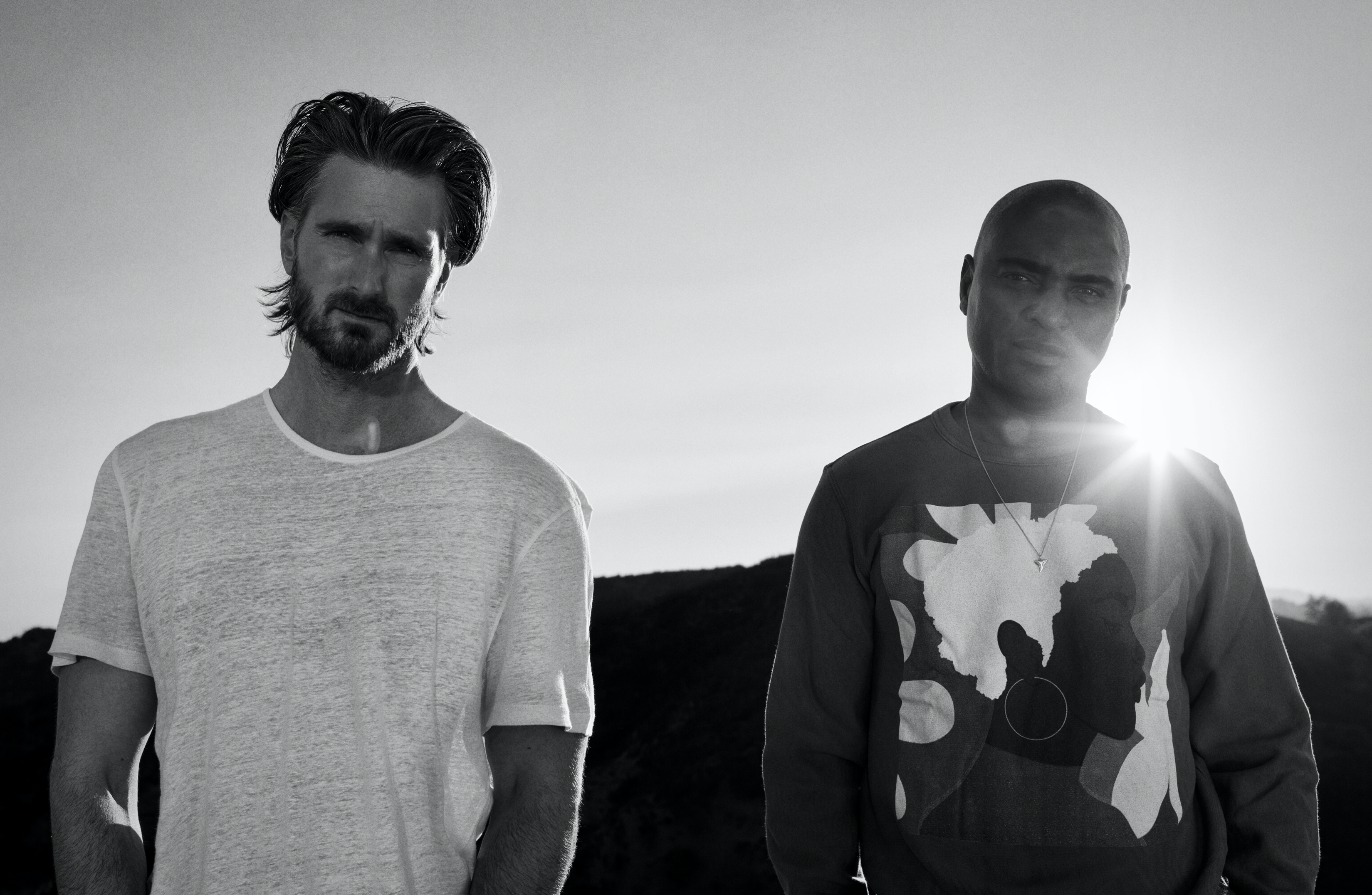
Christopher Renz (left) and Gerard Bush. Photo by Ryan DeForeest.
Antebellum is both jarring and polarizing, and that’s exactly the point. Written and directed by Gerard Bush and Christopher Renz, their debut feature film follows a modern woman named Veronica (Janelle Monáe) as she is seemingly transported to the Antebellum South, where she assumes the name of Eden as an enslaved woman. What unfolds is a horrific and surprising look at slavery through a contemporary lens. The film—which draws from a short story written by Bush, inspired by his nightmare—employs a level of violence that at times feels gratuitous, but as the writer/director duo notes, the horror is meant to trigger and disturb you. “We felt that it was necessary to put the mirror up to this country,” Bush says. “Look at it. Look at it because it’s happening right now. I’d rather for people to be somewhat triggered within the safety of their own homes than for us to continue to lie to each other and live in an open air shooting gallery every time I leave my front door.” Below, Bush and Renz discuss the urgency of Antebellum, casting Janelle Monáe, and the polarizing nature of their film.
———
JULIANA UKIOMOGBE: Tell me a little bit about the nightmare that inspired the short story, which then inspired this script.
GERARD BUSH: Well, I’m an artist. So for me, the majority of my ideas come through dreams and visions and promptings. At the end of the day, I believe that purpose gives birth to the individual and that the individual doesn’t give birth to purpose. And so when you are aligned with that thing that feels right and true for you, then you’re compelled to do it. I was compelled to tell the story of this nightmare because my father had died suddenly about a year prior, and I was having a lot of difficulty in processing that death. I felt intuitively or intrinsically that this story was ancestral, that it felt urgent. And I don’t think that I could have moved forward as an artist without telling the story I had. I was compelled to do it.
UKIOMOGBE: The film transitions from the Antebellum South to present-day, and then back again. I’m curious to know how you navigated the shifts in tone, because they read like two different movies.
BUSH: Well, I mean, for us as filmmakers, we’re fascinated by the change in perception by shifting paradigm and perspective. So that was a line of inquiry that we actively explored, and it was important that it feel seamless because that’s a part of the disorientation of the movie. I don’t know if, for us, there was ever a thought that we weren’t going to try to make the transitions from Veronica’s life versus Eden’s life without having those threads, those through lines.
CHRISTOPHER RENZ: But at the same time, it should be jarring. It should be something that’s completely different. I mean, the allegory of the film is providing a modern context for American slavery and showing what happened before, which was completely different, obviously—the lives of people before they were brought over here. That was something that we definitely wanted to show because as you know, in the U.S. there’s nothing on Black history before slavery. It was important for us to show Veronica in her full power in a completely different world.
BUSH: You have to go and watch a PBS special with Henry Louis Gates to get the information on the African diaspora and what it was like for people before they were enslaved. And so the recontextualizing of this country’s original sin was crucial in order for us to pluck that empathetic cord, and, even more important than that, to correct the record of what the foundation of the country really is.
UKIOMOGBE: Why did you decide to begin the film with a William Faulkner quote: “The past is never dead. It’s not even past”?
BUSH: We chose the quote because what we’re saying is that until we have the courage to confront our past with all of its ugliness, the truth of the past, we will continue to be haunted by the present, and the past in our present. And it will most likely rob us as a country of our shared future.
UKIOMOGBE: Did you have Janelle Monáe in mind as you were writing the script?
BUSH: We didn’t. Veronica Eden was such a mythological character. We could not really visualize the actor that would play Veronica. I know that initially for us, we had concerns about a big star and that their persona would supersede the character. But when we saw Janelle sitting in the audience of the Grammys in 2018, she had this really stoic, powerful expression. We could see right under the surface that there was this furnace burning bright and it was reaching the surface. It felt like we had found our Veronica Eden when we saw that. So luckily everything worked out the way that it did.
UKIOMOGBE: Did you shoot on location?
BUSH: We did. We were insistent upon a couple of things. We were insistent upon shooting the movie on the lenses from Gone with the Wind. That was crucial. We wanted to use those lenses to use this same weaponry that was used to misinform and create effective propaganda to correct the record. The second thing that we were insistent upon was shooting on an actual plantation. And I think that we had this idea academically about what that experience would be. But shooting on the plantation is essentially the same as shooting on an open air haunted house. It was spiritually and psychologically taxing for the cast and for us. It’s not an easy thing. On paper, it was the right thing to do, but the experience… if you’ve not been to an actual plantation, I can’t really explain it. There’s a palpable energy. We believe in ancestry and we believe that that energy is everywhere.
RENZ: We also wanted to make sure that we were respectful of the plantation and the cabins of the enslaved people. We didn’t shoot in them. We built replicas further down the row. So we were shooting in that location, but not in the actual cabins.
UKIOMOGBE: It must have been really hard to go to that site every day. What effect did that have on you over time?
BUSH: It made me really angry. It wasn’t that we felt a sadness. It’s a rage, and it’s a rage that continues to drive you. I don’t know if rage is an especially productive emotion, but that is how it felt. And you wish that you could go back and fight and be a part of the rebellion.
UKIOMOGBE: While there were some disturbing moments in the film, you use Gabourey Sidibe‘s character as the comedic relief. How essential was it for you to infuse humor into a horror film?
RENZ: I think it was essential in that we’re showing these women in their lives, in their full power, and Gabourey Sidibe for sure portrayed Dawn in her full power and living her best life. It was paramount for us to show that.
BUSH: We really did not think specifically about humor. We thought more about accurately depicting these particularly accomplished Black women in their lives. It was really important to depict the extraordinary nature of Black women and how they relate to one another as girlfriends and as people that are having to deal with a lot of issues, but in a way that is quite dignified.
UKIOMOGBE: Speaking of accomplished Black women, how did you decide on Veronica’s profession? She could have been a grocery store clerk, she could have been a banker. Why did you decide to make her an accomplished professor and author?
BUSH: Because we’re surrounded by these sorts of Black women in our own lives. My mother is probably more Dominique Deveraux than she is Diahann Carroll and my sister is a Spelmanite. All of our friends are either Howard or Spelman women. These are the sorts of Black women that I knew that were both academic and really powerful. It was sort of a conflict because I never had any desire to create a slave narrative. In fact, I was always pretty uncomfortable with the idea of seeing my people in bondage, but then at the same time, I felt compelled since the nightmare was delivered to me. And I felt that it was seeded ancestrally that I needed to tell the story, but I needed to tell that story while also accurately depicting the powerful Black women that I know and putting them on screen so that we can show you. I mean, hopefully, we’re going to have a Black woman as our vice president, and eventually our President. We need to actually take control and responsibility over our own narratives and how we’re going to put ourselves forward on the screen. Not only for other people that don’t belong to our communities, like an ally in Christopher, who’s my partner and does all this with me, but also to ourselves. It’s important to me that as a Black filmmaker, I’ve put a mirror up to the ugliness of the truth that is this country and the country’s founding, but also that I highlight and amplify the truth of the sovereignty in the dignity and power of Black women.
RENZ: We got that same question in a lot of notes as we were shopping the script around. Obviously, Lionsgate was fantastic and they saw our vision, but a lot of other studios had that exact question. “Can we make Veronica a single mom? What if she wasn’t as wealthy? What if her husband was cheating on her?”
BUSH: There were studios that were insistent that that be her story. I think that you have to write about the things that you know, so we wrote the Black women that we know. My parents have been married for 40-plus years. My sister’s been married for 17 years, and it’s not to say that there is anything wrong when your life demands changes. I’m just saying that it would be disingenuous for us to write about that Black woman when we personally know this Black woman that you see on the screen.
UKIOMOGBE: What other pushback did you get?
BUSH: Well, there were Black folk and white folk alike on the studio side that were really uncomfortable with the truth of the brutality. And for us, we were insistent upon not participating as co-conspirators in the erasure of our own history. It’s a softball we’re throwing about what the country’s history really is and how it still impacts and affects Black people today. I continue to hear of those on the extreme right talking about Black folk pulling ourselves up by our bootstraps. Well, I had a boot and a strap, and this goes all the way back to building this country on the backs of free labor and stolen bodies. And so we needed to depict what that was and the collective psychopathy of an entire white society that metastasized across the South, primarily. And in order to do that in an accurate way, in a way that is truthful, we needed to, without being exploited, demonstrate what that was. We were very careful to honor the past and the truth of it while also recognizing that we needed to be incredibly responsible in how that was depicted. The needle needed to be carefully threaded. Luckily for us, we have a really supportive studio partner and a really supportive star of our film in Janelle who was insistent also on the truth.
UKIOMOGBE: Tell me about the character Julia (Kiersey Clemons). She suffers a lot of violence in the film. What’s her role in the overall storyline?
BUSH: Well, it was really important to include her in it because she’s a Sandra Bland. We wanted to talk about racism in medicine and pregnancy for Black women in this country. We wanted to confront that head-on. I’m from Houston, Texas, and I saw Sandra pulled over in Prairie View in the video, and then suddenly she’s hanging in her jail cell. And when you go back to the history of Black women that were enslaved, many of whom would commit suicide rather than bring children into the world enslaved. It was important that we tether the modern world to that of the past, and Julia’s character was essential to that. When you look at the film, if you pay close attention, you recognize that she is a disciple of Veronica. It was something that we really grappled with because obviously, I don’t want to sit there and see a young, beautiful, brilliant Black woman have to endure this kind of abuse. Just to talk about it makes me squirm, but we felt compelled. We felt that this was necessary to put the mirror up to this country. It’s not an easy thing to be a filmmaker or a storyteller that feels so compelled to tell a story or to make a movie that is as polarizing as this. But unfortunately, that privacy is now out the door because the film is what it is. We felt a responsibility that we needed to do this, and we’ve done it. We’re very proud of it and we hope that it is a prescription, that it’s medicine. This medicine is definitely a jagged little pill to swallow toward getting the cure, but it’s necessary.
UKIOMOGBE: What other work influenced this film? I see hints of Kindred by Octavia Butler. I see pieces of The Shining.
BUSH: Well, we definitely were not inspired by Kindred, although we have a lot of respect for Octavia, because it was a nightmare that was really unique to me and the story. Really, when you look at the movie, you find out that it’s not Kindred at all. We try to stay as aligned with our own sort of original voice, however, we do tip our hats to Kubrick because we love him as a filmmaker. Also, we’re obsessed with movies from the ’70s, so whether it’s The Stepford Wives, Invasion of the Body Snatchers, or in the late ’60s, Rosemary’s Baby, we like this palpable, psychological thriller and this energy that’s just at the surface that you can’t quite put your finger on.
UKIOMOGBE: Your movie is being released at the intersection of Black Lives Matter protests, a global pandemic, and an upcoming election. What does this moment in time mean to you for the film’s release?
BUSH: Well, all of the work that we’ve done up until this moment is motivated by the necessity to amplify the issues of inequality and Black genocide up to this point. As prescient as the film may feel to some people at this moment, we already knew that this was going to happen. We knew when Obama was elected, as giddy as all of us were that we had this brilliant Black president, that the backlash was going to be immediate and violent and that it was going to push us toward what we have now. So this is medicine for this moment. The last thing that we wanted as artists was to put ourselves in a situation where we are a part of these polarized conversations. The movie is polarizing, quite frankly, because it does jar and it does make people confront the truth. And in some of that, I think that it requires a certain intellectual stamina that can get you to the other side of the movie toward catharsis. So the intersection of this particular moment where we have a blatantly racist, incompetent president who is trying to steal the mantle of any freedom that we have in this country and really place us under authoritarian rule, it is essential that we not tell benign stories, that we not participate in playing a violin on the deck of the Titanic. I think that we have to scream as loud as we can from the rafters. It is vital that the movie be launched in this particular moment, so that we can have a big, loud conversation. This has got to stop.

